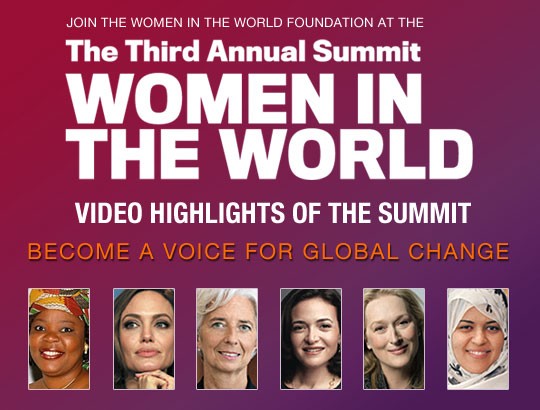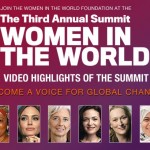
Guest Post: where are the women and why does it matter
Third Annual Women in the World Summit: where are the women and why does it matter
Maria Stohler
 Last month, hundreds of women gathered at New York’s Lincoln Center for the third annual Women in the World Summit, hosted by Newsweek and The Daily Beast.
Last month, hundreds of women gathered at New York’s Lincoln Center for the third annual Women in the World Summit, hosted by Newsweek and The Daily Beast.
At the heart of the summit was the question of political representation and executive leadership: where are the women, and why does it matter? The panels addressed a wide range of issues: gender parity and economic opportunity in America; international security and women in conflict zones; sex trafficking; forced marriage; the underreported violence facing women in Central America; girls and the ever-increasing reaches of technology; hunger and refugee crises in Africa; the issues facing women in the American military; and the issues facing women of the Arab Uprising. These grave problems were presented with unflinching honesty and emotion.
In an interview by Charlie Rose on opening night, former Secretary of State Madeleine Albright set the tone. When asked why there were so few women in power, she didn’t miss a beat: “Men!”
Secretary Albright later called the idea that we lack women in power due to a dearth of qualified women “one of the biggest bullshit things I’ve ever heard.” Male culpability in preventing female representation and leadership was cited on more than one occasion. Still others emphasized women’s responsibility to take action and to support each other. Cheryl Mills, a senior official at the State Department, asked pointedly, “when other people see you want [a position of power and leadership], are they prepared to embrace it?” The culprits implied were not men alone, and the entire theater hummed with acknowledgement.
But what is the end goal of training girls in leadership, gaining political representation and empowerment for women? When asked why it matters that women hold advanced positions in security issues, Jane Harman suggested that women are “lionesses with a fierce instinct to protect,” that women go to war less, and that women are more likely to try to resolve problems than men.
On this, the speakers were in unanimous agreement: women’s representation is a means to a better life for all—safety for women and girls, security for families, communities, and nations. And just as importantly, women’s achievement is an end in itself. One of the most poignant justifications was elicited by Zainab Salbi, founder of Women for Women International, who said “you cannot succeed as a leader if you don’t address what fifty percent of your people are asking for.”
At the heart of this need for women’s empowerment is the message conveyed by Bibi Hokmina, an Afghan woman elected to a provincial council in Khost who dresses (and looks) like a man. She first dressed as a boy when her father told her to work shoulder to shoulder with her siblings; but when asked if her father instructed her to dress that way because he knew she wouldn’t “make it” as a female, Bibi Hokmina shook her head. She replied that dressing as a man is her prerogative, that people of her village respect her, and that only by virtue of the fact that she empowered herself was she able to stand on a stage in New York City and tell her story. She was answered with roaring applause.
– –
For video of the panel discussions and speakers, including Hillary Clinton, Christine Lagarde, Angelina Jolie, Meryl Streep, Valerie Jarrett, Sheryl Sandberg, Leymah Gbowee, and more, go here. To read Newsweek Editor-in-Chief Tina Brown’s favorite moments, go here.
About the author:
Maria Stohler is a former American Security Project intern primarily interested in foreign policy and the Middle East. She is a graduate of Notre Dame and holds a Master’s degree in international relations.






[…] Guest Post: where are the women and why does it matter […]